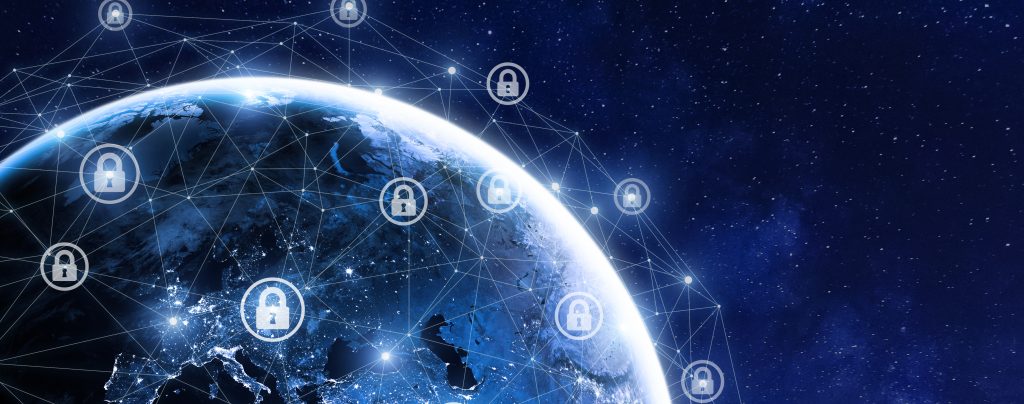
- 9. December 2020
Cybersecurity in Space and on Earth
In our modern, data-driven world, space infrastructures are having a growing impact on the economy and society in general. Constant, reliable localisation and navigation; high-resolution images of Earth’s surface; precise weather data; communication and satellite television – these are just a few examples of how satellite infrastructure has found its way into our everyday lives in recent decades. Meanwhile, terrestrial and orbital communication channels are becoming more and more interconnected. As the number of satellites in space increases along with their importance to a functional modern society, so too is the need for appropriate and up-to-date security mechanisms. In addition to the mechanical security of satellite constellations, digital security is a top priority.
Virtual security from space
Satellite infrastructures need to be hardened against not only random disruptions due to things like space weather, outages, or programming errors, but also eavesdropping, jamming, spoofing, hacking, and other types of targeted attacks. This requires an array of different security mechanisms and solutions with the ability to continually adapt to new challenges. In other words, the ongoing development of cybersecurity in satellite systems is a must. Constant improvements in satellite signals and space technologies can make data transfers more secure on Earth, as well.
Thanks to the ever-increasing amounts of bandwidth available across broad sections of our planet, complex but highly secure methods – blockchain, for example – can be used all around the world. Here, satellites serve as a key interface among the individual nodes involved while also providing coverage to more remote areas that otherwise have poor internet connectivity (or none at all). Furthermore, using satellites makes cryptographic techniques highly robust: Data out in space is, after all, better protected against physical attacks and technical failures.
The highly precise time and positioning data provided by Europe’s Galileo satellites can also be used for other purposes, such as in other cryptographic keys or in validating other information. This precision makes it possible to clearly identify those sending and receiving satellite signals, which in turn helps guard against fraud. In the future, the Galileo system is to offer its own mechanisms for authenticating transmitted positioning data; these will also open up numerous possibilities with regard to cybersecurity.
One of the most well-known methods of manipulating GNSS signals is spoofing. This involves overlaying authentic satellite signals with fraudulent signals. Luckily, the Airbus project Spoofer is demonstrating how artificial intelligence and various algorithms can be used to identify spoofers and validate the authenticity of GNSS signals.
One way to make satellite-based data transmissions more secure involves the use of quantum keys and quantum memory. The German research project QuMSeC developed a related approach that can even be applied to untrusted satellites, which means it is also suitable for users who have no satellite infrastructure of their own. For this innovative solution, the team behind QuMSeC was named the winner of the INNOspace Masters DLR Challenge and the overall winner of INNOspace Masters 2019/20. The competition is now supporting its ongoing development with around EUR 400,000 in funding.
Cybersecurity in satellite systems: a complex matter
On the subject of space infrastructure, one distinguishes among the following three areas with relevance to security: ground control stations on Earth, satellites in space, and the communication that takes place between them.
Control centres on the ground need security mechanisms that prevent unauthorised entities from accessing satellite control systems, sensitive data, and privileged communication channels. At the same time, satellites must be protected in terms of not only their components and software, but the manner in which they are controlled and how they communicate with our planet, as well.
INNOspace Masters fosters new approaches to increasing cybersecurity
In today’s society, cybersecurity is more important than ever – and that trend is sure to continue. Both satellite systems themselves and the data they transmit must be adaptable to a constant series of new challenges. Meanwhile, satellite signals continue to become more precise and robust, which is also important to digital security on Earth. This opens the door to many opportunities for new technologies and services to safeguard data both up there and down here. Ideas like these are exactly what the German Aerospace Center (DLR) is looking for through its involvement in INNOspace Masters. In a total of five challenges, the DLR – along with Germany’s ESA Business Incubation Centres, Airbus, OHB, and DB Netz AG – will be encouraging entrants to submit innovative approaches to ensuring secure and sustainable infrastructure in space and on Earth until 5 February 2021. The winners of these challenges will receive tailored prizes and up to EUR 400,000 in funding they can invest in the long-term realisation of their concepts. Discover the winning entries from years past for inspiration, or start your own application straight away!